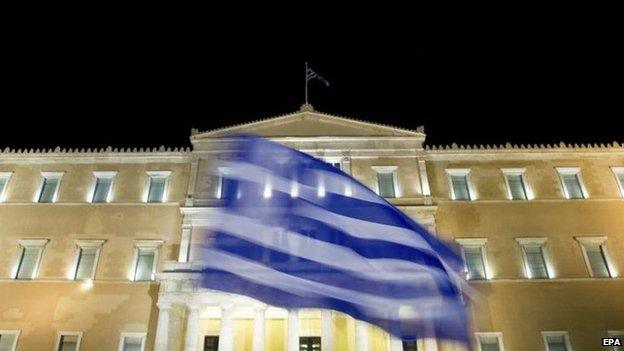Huge costs of Greece staying in or quitting euro
- Published
- comments

Greek banks had expected to see Yanis Varoufakis at their emergency meeting last night on how to save them from collapse.
This morning they learned why he didn't turn up: he was being bundled out of the Greek aeroplane by the pilot and Prime Minister Alexis Tsipras.
According to Mr Varoufakis, external, some European finance ministers had requested his absence from fraught bailout negotiations.
The Greek prime minister has obliged them, in what looks like a desperate last gambit to reach some kind of rescue deal, after yesterday's momentous vote by the people of Greece to reject terms offered by creditors 10 days ago.
As for the emergency meeting last night between the Bank of Greece, Greek banks and other representatives of the Athens government, that decided banks today will be subject to the same restrictions as last week (no transfers of funds abroad, a €60 limit on withdrawals from cash machines, a third of branches to open so older people can get their pensions).
But those restrictions expire at the end of today. Which means there will be another meeting of the banks and the authorities tonight to decide how and whether the banks can operate tomorrow.
The damoclean sword hanging over Greece is that the banks will run out of cash in just a few days.
Which means that a decision on what kind of limited service the banks can provide, to be made by the Greek government, will hinge entirely on whether the European Central Bank's (ECB) governing council decides to freeze, cut or increase the provision of Emergency Liquidity Assistance, or emergency loans to Greece.
As for the ECB, it does not wish to be seen as Greece's Judge Dredd. It will take its lead from any statement by eurozone government heads on whether there is a realistic chance of a new deal to rescue the finances of the ailing Greek state.
So the fate of Greece lies firmly where it always did, in the lap of the German Chancellor, Angela Merkel and her fellow heads of government.
And here is the horrendous analysis of costs that they need to make.
They can allow themselves to be humiliated and write-off up to half of the €200bn odd of bailout finance they've provided to Greece since its debacle crystallised at the end of 2009 - and thereby provide a sounder financial basis for Greece remaining in the euro.
That would be viewed as the equivalent of a plate of cold sick by the administrations of Portugal and Ireland, inter alia, who were never offered such absolution for their spendthrift and reckless ways. And many German voters would fail to understand why Mrs Merkel was apparently throwing a jumbo jet of good money after bad.
But she would preserve the important conceit that membership of the euro is forever. And she would protect the ECB from humungous losses on its €140bn odd exposure to Greece.
Because although the ECB holds assets - Greek mortgages and business loans - worth in theory 35% more than the €89bn of Emergency Liquidity Assistance provided via the Bank of Greece, these assets or collateral would collapse in value (more than halve) in the event that Greece leaves the euro.
And what about doing what some German politicians are now openly mooting, which is to push Greece off into vast global markets with a new currency of its own.
Well this would be enormously expensive too.
Because Greece has almost no foreign currency reserves (perhaps €2bn-€3bn in gold, in another central bank's vaults).
Which means that it would quickly run out of essential imported goods, from raw materials, to food, to medicine, because no overseas suppliers will take credit from Greece in new money that they will see as funny.
Bankers tell me that to avoid total economic collapse, and penury for Greeks, the IMF and the eurozone would have to provide Greece with up to €25bn of hard currency, to ease its transition to a new currency, a new Drachma.
Greece simply can't pay for what it needs from exports, because its exports are just 13% of GDP or national income.
Or to put it another way, staying in the euro would be horrendously expensive for Greece and the eurozone. And exiting the euro would be horrendously expensive for Greece and the eurozone.
But with the Greek banking system perilously close to total collapse, eurozone leaders have only hours to decide which bill they wish to pay.